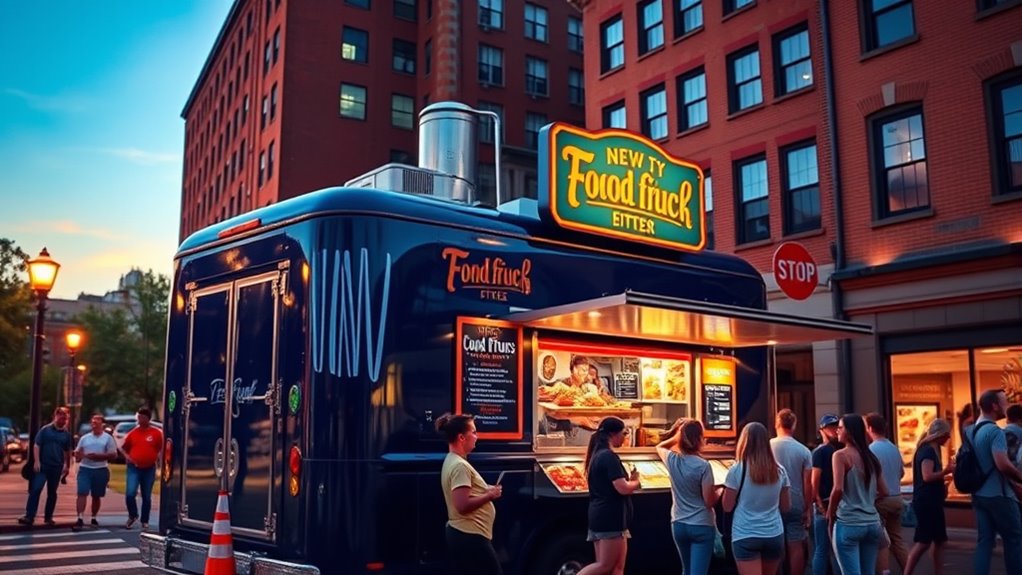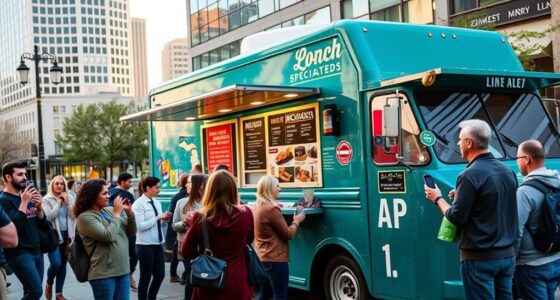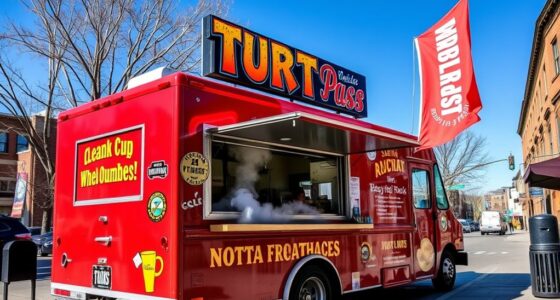To open a food truck in New Haven, you’ll need permits like a Food Service Operation License, Qualified Food Operator Certificate, and a Connecticut State Tax ID. Costs vary but expect around $450 annually plus fees for permits, equipment, and location—make sure your truck fits within size and parking rules. Safe food handling and marketing strategies are key to success. If you want to know more about maneuvering these steps, keep going for details.
Key Takeaways
- Obtain all necessary permits, including a Qualified Food Operator Certificate, Food Service License, Connecticut Tax ID, and parking permits, before launching.
- Budget approximately $450 annually for licenses and permits, covering food truck fees, space rentals, insurance, and safety compliance.
- Ensure vehicle width is under 10 feet, follow zoning and parking regulations, and secure fire and health inspections for location approvals.
- Comply with menu restrictions (typically $5-$10 items), maintain food safety standards, and have proper equipment like refrigeration and handwashing stations.
- Use social media, participate in local events, and implement digital marketing tools to boost visibility and grow your customer base.
Navigating the Permitting Process in New Haven
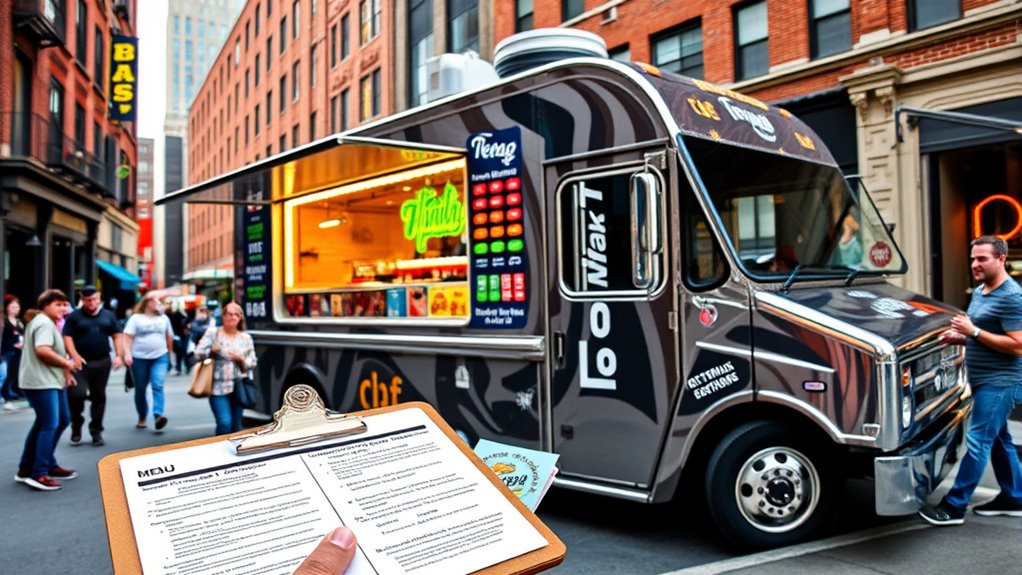
Are you ready to start your food truck business in New Haven? Navigating the permitting process might seem intimidating, but staying organized makes it manageable. First, you’ll need a valid Qualified Food Operator Certificate, which is mandatory for all vendors. Each vendor must have their own license, permit, and insurance—sharing credentials isn’t allowed. You’ll also need a Connecticut State Tax ID certificate and a completed Federal ID W-9 form before applying. All licenses have to be secured before participating in any events, as on-site licensing isn’t permitted. Additionally, you must obtain a Food Service Operation License from the New Haven Health Department and pass pre-opening inspections. Remember, compliance with local regulations and timely online submissions via CitySquared are essential to keep your business legal and ready to serve. Regular maintenance and cleaning of your food truck equipment ensures safety and efficiency, helping you stay compliant with health standards.
Understanding the Costs and Fees for Licensing and Permits
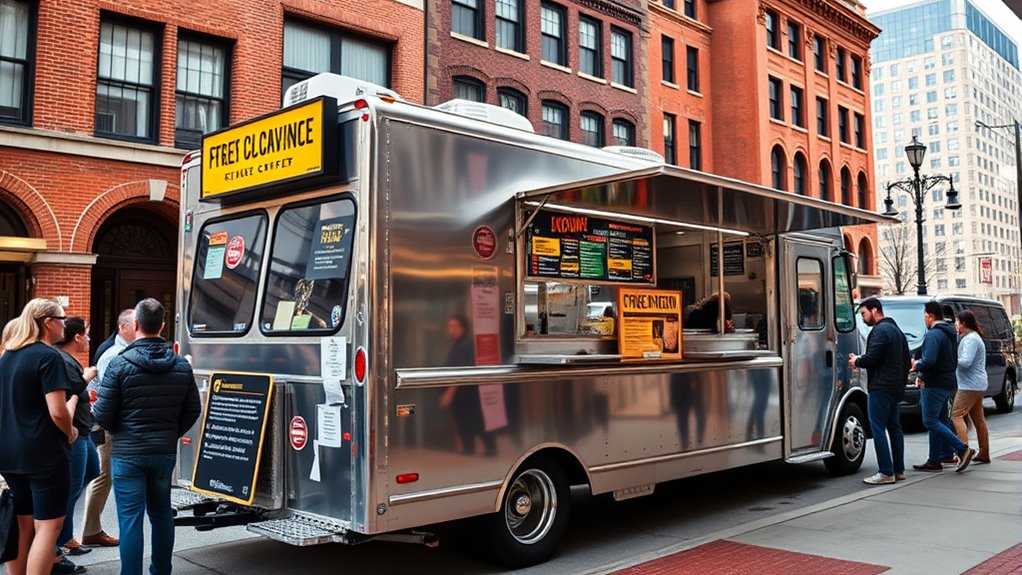
Understanding the costs and fees associated with licensing and permits helps you plan your budget effectively for starting your food truck business in New Haven. License fees vary, with proposals ranging from $200 up to $5,100 annually for street vending licenses, though current estimates are around $450. You’ll pay about $275 for a food truck license, $200–$300 for vendor space, and $175 for food carts. Additional costs include:
Planning your food truck startup? Budget around $200–$5,100 annually for licenses and permits in New Haven.
- $60 for electrical or generator access
- Non-refundable application and license fees paid upfront
- Insurance and fire safety compliance expenses
- Renewals due annually before May 1
All payments must be made via certified check, money order, or credit card; personal checks aren’t accepted. Budgeting for these costs ensures you’re prepared for licensing and permit requirements. Research‑backed insights can further help you anticipate potential unforeseen expenses and plan accordingly.
Location Regulations and Restrictions for Mobile Vendors
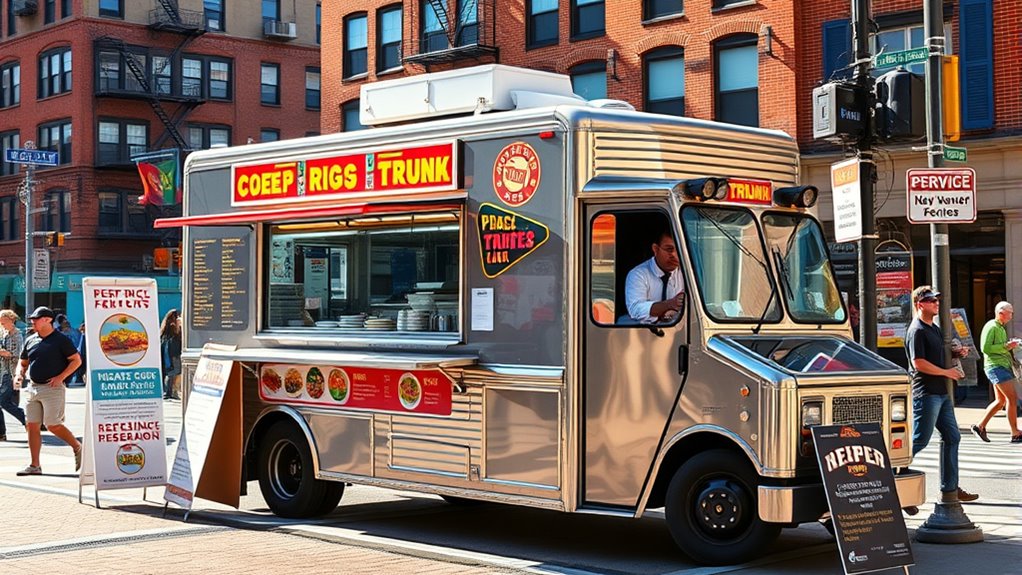
To operate a food truck in New Haven, you must guarantee vehicle size and parking restrictions that assure safe and compliant vending. Your truck cannot exceed 10 feet in width, including any awnings or extensions. Parking in metered city spaces is permitted but subject to specific regulations and permits. Designated cluster locations, like “Food Truck Paradise” off I-95, are favored vending areas, but you still need separate local permits for parking. You must follow zoning rules when selecting vending spots, ensuring your location aligns with city regulations. Additionally, you need to obtain specific parking and fire permits. The city actively enforces compliance through unannounced inspections, focusing on safe propane storage and adherence to health and fire safety standards. The recent adoption of the statewide food truck program by the city has streamlined some of these permitting processes, making it easier for vendors to operate across jurisdictions while maintaining safety standards.
Essential Menu and Food Safety Requirements
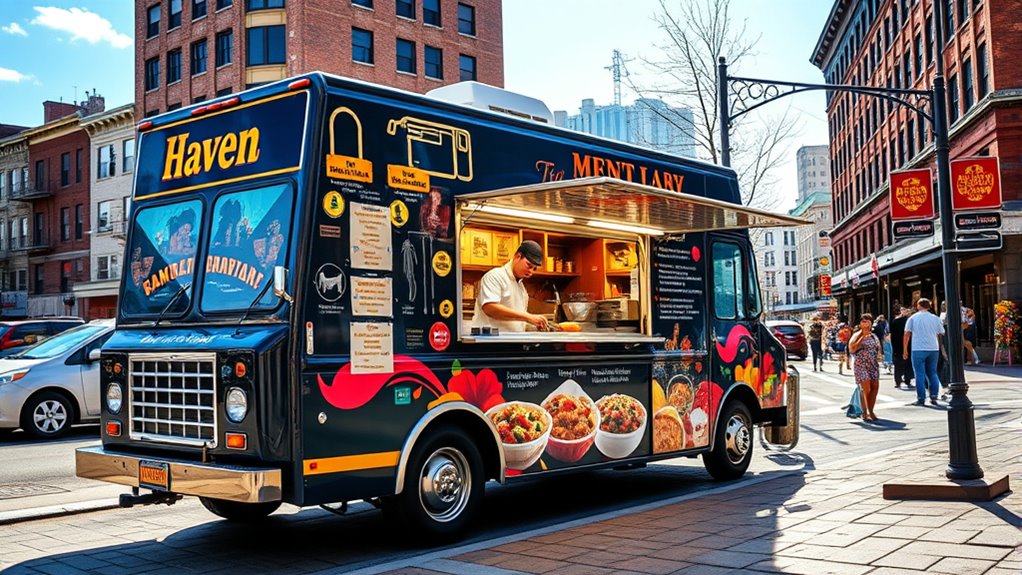
Ensuring food safety and proper menu management is essential for operating a food truck in New Haven. You must follow strict health standards to protect public health and maintain compliance. Your menu, especially at city events, may be limited to items priced at $5 or $10, excluding beverages. Proper labeling and handling of allergen-containing foods are mandatory to prevent cross-contamination. You need to:
- Obtain necessary licenses and certifications, including the Food Service Operation License and Qualified Food Operator Certificate.
- Manage grease disposal with metal containers and ensure proper trash removal.
- Maintain safe food storage temperatures and display practices.
- Equip your truck with refrigeration, food prep facilities, handwashing stations, and proper ventilation.
- Be prepared for health and fire inspections at any time, ensuring all equipment and practices meet regulatory standards to avoid fines and operational disruptions. Additionally, understanding food safety standards is crucial for compliance and customer trust.
Staying compliant with these food safety standards helps you avoid penalties and ensures a successful operation.
Effective Marketing Strategies to Grow Your Food Truck Business

Effective marketing is essential for expanding your food truck business and attracting more customers. Social media is a powerful tool; 68% of food truck owners use it regularly, with Facebook being the most popular—used by 75%. Social campaigns can boost sales by 20%, and customers tend to spend around 15% more when engaged online. Participating in local events and festivals increases visibility and foot traffic, especially during peak seasons. Loyalty programs, such as digital punch cards and discounts, help retain customers and boost repeat business by 30%. Leveraging technology like data analytics, GPS tracking, and CRM software enhances targeted marketing efforts, increasing ROI by 25%. Understanding your audience and neighborhood characteristics allows you to tailor marketing strategies effectively, driving growth and long-term success. Over 50% of food trucks have implemented loyalty programs, resulting in a 30% increase in repeat visits, which can significantly contribute to sustained revenue growth and customer retention over time. Additionally, incorporating insights from raw food diet trends can appeal to health-conscious customers seeking nutritious options, further expanding your customer base.
Frequently Asked Questions
How Long Does It Typically Take to Obtain All Necessary Permits in New Haven?
You’re probably wondering how long it takes to get all your permits in New Haven. Typically, plan for about 6 weeks, especially during peak seasons, to complete the entire process. You’ll need to submit your application, pass fire and health inspections, and get approvals from multiple departments. To avoid delays, guarantee your paperwork is complete and submitted early, and coordinate all inspections smoothly.
Are There Specific Noise Restrictions for Food Trucks Operating in Residential Areas?
You need to comply with New Haven’s noise limits, which are strict in residential areas. During specified hours, you must keep noise below 55 decibels, controlling generators, music, and refrigeration units. You’ll also need to monitor operating times, avoid excessive volume, and follow permitted hours. By managing sound levels proactively, avoiding complaints, and respecting local regulations, you guarantee your food truck runs smoothly without penalties or disruptions.
Can I Operate My Food Truck at Private Events Without City Permits?
You can’t operate your food truck at private events without city permits. Even on private property, you need to acquire the necessary licenses and permits from New Haven’s health and building departments beforehand. This includes health department licenses, fire safety approvals, and possibly other city permits. Skipping these steps risks fines, being shut down, or removal from the event. Always verify all requirements are met before vending at any private gathering.
What Are the Requirements for Parking and Overnight Storage of Food Trucks?
They say “know the rules before you start,” and that’s key for parking and overnight storage. In New Haven, you must park in non-metered, city-approved spots no longer than 26 feet. Overnight storage usually happens offsite, with fire safety inspections needed in the mornings. You’ll need the proper permits, insurance, and approval for each location, making sure you stay within designated zones and follow city regulations.
Are There Tax Incentives or Grants Available for New Mobile Food Vendors?
You should know that while there aren’t many grants specifically for mobile food vendors in Connecticut, several tax incentives could help reduce your costs. The state offers tax credits for investments in equipment and urban reinvestment areas, plus job creation rebates, especially in distressed municipalities near New Haven. Additionally, programs through the Connecticut Department of Agriculture and small business support initiatives can provide indirect financial assistance and growth opportunities.
Conclusion
As you begin your food truck journey in New Haven, remember that charting permits and regulations is your modern-day Odyssey. With careful planning, flavorful offerings, and strategic marketing, you’ll carve out your own legend on wheels. Like Homer’s heroes, embrace the challenges ahead, knowing each step brings you closer to your culinary saga. Stay persistent, adapt to the city’s rhythm, and soon, your vibrant truck will become a beloved staple on New Haven’s bustling streets.
